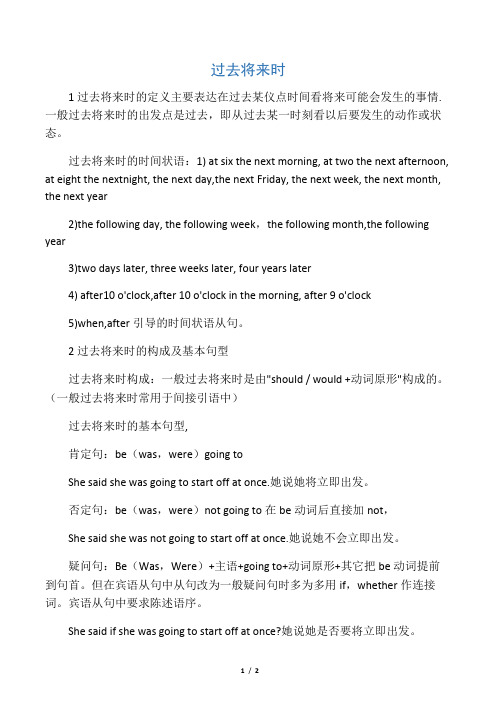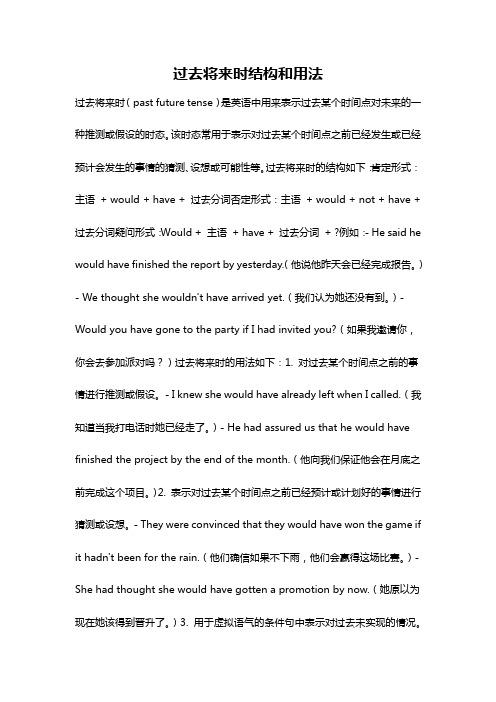过去将来时间
过去将来时的五种表达形式

过去将来时的五种表达形式
过去将来时是指过去某个时间点预计将要发生的动作或事件。
下面介绍五种表达形式。
第一种是使用was/were going to +动词原形。
例如,他说他退休后要住在农村。
第二种是使用was/were +动词-ing形式。
例如,没人知道客人们是否要来。
第三种是使用was/were +动词不定式。
例如,据报道长江上将要再建一座大桥。
注意,was/were going to +动词原形或was/were +动词不定式完成式可表示未能实现的过去将来时间的动作。
第四种是使用was/were about to do。
这表示说话的瞬间就会发生的动作。
例如,我觉得有可怕的事要发生了。
第五种是使用was/were on the point of doing。
例如,很高兴你来了。
我正准备给你打电话,现在你省去我这个麻烦了。
注意,be about to do和be on the point of doing结构一般不与表示将来的时间状语连用,但后面可以接when引导的分句。
最后,特定场合的一般过去时也可表示过去将来时。
在条件状语从句和时间状语从句中,须用一般过去时代替过去将来时。
初中英语时态过去将来时态的详解

过去将来时1过去将来时的定义主要表达在过去某仪点时间看将来可能会发生的事情.一般过去将来时的出发点是过去,即从过去某一时刻看以后要发生的动作或状态。
过去将来时的时间状语:1) at six the next morning, at two the next afternoon, at eight the nextnight, the next day,the next Friday, the next week, the next month, the next year2)the following day, the following week,the following month,the following year3)two days later, three weeks later, four years later4) after10 o'clock,after 10 o'clock in the morning, after 9 o'clock5)when,after引导的时间状语从句。
2过去将来时的构成及基本句型过去将来时构成:一般过去将来时是由"should / would +动词原形"构成的。
(一般过去将来时常用于间接引语中)过去将来时的基本句型,肯定句:be(was,were)going toShe said she was going to start off at once.她说她将立即出发。
否定句:be(was,were)not going to在be动词后直接加not,She said she was not going to start off at once.她说她不会立即出发。
疑问句:Be(Was,Were)+主语+going to+动词原形+其它把be动词提前到句首。
但在宾语从句中从句改为一般疑问句时多为多用if,whether作连接词。
过去将来时结构和用法

过去将来时结构和用法过去将来时(past future tense)是英语中用来表示过去某个时间点对未来的一种推测或假设的时态。
该时态常用于表示对过去某个时间点之前已经发生或已经预计会发生的事情的猜测、设想或可能性等。
过去将来时的结构如下:肯定形式:主语+ would + have + 过去分词否定形式:主语+ would + not + have + 过去分词疑问形式:Would + 主语+ have + 过去分词+ ?例如:- He said he would have finished the report by yesterday.(他说他昨天会已经完成报告。
)- We thought she wouldn't have arrived yet.(我们认为她还没有到。
)- Would you have gone to the party if I had invited you?(如果我邀请你,你会去参加派对吗?)过去将来时的用法如下:1. 对过去某个时间点之前的事情进行推测或假设。
- I knew she would have already left when I called.(我知道当我打电话时她已经走了。
)- He had assured us that he would have finished the project by the end of the month.(他向我们保证他会在月底之前完成这个项目。
)2. 表示对过去某个时间点之前已经预计或计划好的事情进行猜测或设想。
- They were convinced that they would have won the game if it hadn't been for the rain.(他们确信如果不下雨,他们会赢得这场比赛。
)- She had thought she would have gotten a promotion by now.(她原以为现在她该得到晋升了。
英语语法:过去将来时的用法的说明

英语语法:过去将来时的用法的说明过去将来时的用法说明1. 基本结构与用法过去将来时由“would+动词原形”构成,主要表示从过去某一时间来看将要发生的事情(尤其用于宾语从句中):He told us he would help us. 他告诉我们他会协助我们。
I knew you would agree. 我当时就知道你会同意的。
【注】在一定的语境中也可于其他从句或句子中:It was a problem whether they would support us. 他们是否会支持我们还是一个问题。
It was six o’clock. The sun would soon set. 这时是六点钟。
太阳即将落山。
2. 过去将来时间的表示方法除“would+动词原形”外,过去将来时还有以下常见表达方式:(1) 用was (were) going to表示。
表示过去某时准备做某事:Marsha was going to come with us. 玛莎准备和我们一道去。
I was going to leave when he came in. 他进来时我正要离开。
【注】was going to在一定的上下文中有时可表示过去未曾实现的想法或打算:She was going to attend the concert last night, but she was too busy. 她昨晚本想去听音乐会的,但她太忙了。
(2) 用was (were) about+不定式表示。
表示在过去看来正要做某事:I was just about to go to bed when he came to see me. 我正要睡觉,他来看我了。
(3) 用于was (were) due to表示。
表示定于过去某时将要做某事:They were due to leave at ten o’clock. 他们定于十点出发。
过去将来时知识点归纳与总结

过去将来时知识点归纳与总结过去将来时是英语中的一种时态,用于表示过去某一时间点或某一事件之后将要发生的动作或状态。
本文将对过去将来时的知识点进行归纳与总结。
一、过去将来时的构成过去将来时由助动词"would"加动词原形构成,也可以使用"was/were going to"或"was/were + 动词+ing"来表示。
例如:"I would visit my grandmother tomorrow."(我明天将要去看望我的祖母。
)二、过去将来时的用法1. 表示过去某一时间点之后将要发生的动作或状态。
例如:"He said he would call me later."(他说他过会儿会给我打电话。
)2. 表示过去的推测或猜测。
例如:"I thought she would be angry, but she wasn't."(我以为她会生气,但她并没有。
)3. 表示过去的习惯或经常性动作。
例如:"When I was young, I would often go swimming in the river."(小时候,我经常去河里游泳。
)三、过去将来时的时间状语过去将来时常常与一些特定的时间状语连用,如"tomorrow"(明天)、"next week"(下周)、"in the future"(在将来)等等。
这些时间状语可以帮助我们更准确地理解句子的意思。
四、过去将来时与其他时态的区别过去将来时与其他时态的区别主要在于时间上的不同。
过去将来时表示过去某一时间点之后将要发生的动作或状态,而其他时态则表示不同的时间关系。
例如,现在完成时表示过去发生的某个动作对现在产生的影响,而将来进行时表示将来某一时间点正在进行的动作。
过去将来时态

一、过去将来时的基本概念将来时,是表示在说话的时间以后将要发生的动作。
过去将来时,是指在过去某个时间里,计划将来要做的事,它仍然属于过去时间内的动作。
例如,在去年的2007年10月份,你计划在2007年11月份去一趟北京,这就是过去将来时。
二、过去将来时的构成和用法1、should / would +动词原型这是表示过去将来时最基本的结构。
我们知道,一般现在将来时是用助动词shall, will 表示将来要做的事。
那么,过去将来时,就用shall, will 的过去式即should, would 表示过去将来时。
在英语中,第一人称I, we 用should ;其它人称或事物则全部用would。
但是在美国,甚至包括现代的英国,有一种趋势是:所有的人称或事物都用would 来表示过去将来时。
过去将来时最基本的用法,就是表示在过去某个时间后将要发生的事。
请看过去将来时的例子:She was sixty-six. In three years, she would be sixty-nine.她66岁了。
三年后,她是69岁。
We should not have the sports meeting if it rained.如果下雨,我们就不举行运动会了。
I didn''t know how to do it. What would be their ideas?我不知如何去做,他们会有什么想法呢?The farmers didn’t know whether they would have a good harvest.农民们不知道他们是否会有一个好收成。
2、be going to do这个短语可以用来表示将来时。
在过去时中,应当将be 改为was/were,即was / were going to. 这个短语的特点是,它通常在句子如带有一个表示将来时间的状语。
例如:Li Mei said that she was going to visit her grandma in the country the next Sunday.李梅说下星期天要去看望她乡下的祖母。
过去将来时的用法与时间表示

过去将来时的用法与时间表示过去将来时,也称为“过去的将来”,用于表示过去某个时间点或某一时刻的未来事件。
在英语语法中,过去将来时是一种介于过去时和将来时之间的一种时态。
本文将介绍过去将来时的用法和时间表示方法。
一、过去将来时的用法1. 表示“过去计划中的将来事件”过去将来时常用于表达过去某一时刻的计划或打算,而在那个时刻看来,那些事件是将来发生的。
例如:I thought we were going to have dinner together last night.(我以为我们昨晚要一起吃晚饭。
)She said she would visit her parents over the weekend.(她说她会在周末去看望她的父母。
)2. 表示“过去的未实现的可能性”过去将来时还可用于表示与过去事件有关的未实现的可能性。
例如:If I had known earlier, I would have come to help you.(如果我早些知道,我会过来帮你的。
)He was confident that he would win the game.(他确信自己会赢得比赛。
)3. 表示“间接引语中的将来事件”过去将来时还常用于间接引语中,表示来自过去事件的某个将来事件。
例如:He told me that he would leave the company.(他告诉我他要离开这家公司。
)She said she would call me later.(她说她会稍后给我打电话。
)二、过去将来时的时间表示1. 定时词在过去将来时中,常使用一些时间词来表示具体的过去某一时刻。
例如:yesterday(昨天)last week/month/year(上周/上个月/去年)at that time(当时)2. 时间短语除了定时词,我们还可以使用时间短语来表示过去将来时。
例如:by the time(到...时候)before(在之前)until(直到)三、例句1. I thought we were going to have dinner together last night, but you went out with your friends.(我以为我们昨晚要一起吃晚饭,结果你和朋友出去了。
英语时态:过去将来时

英语时态:过去将来时过去将来时(The Past Future Tense)通常来说指的是一般过去将来时(The Simple Past Future Tense),表示从过去的某一时间来看将来要发生的动作或呈现的状态,基本出发点是过去,过去某一时刻以后要发生的事情;过去将来时常用于宾语从句中。
Ⅰ. 句法结构:1.陈述句:A. 肯定形式:主语+be going to /would/should +动词原形+其他B. 否定形式:主语+be not going to或would/should not+动原+其他注:a. 否定形式直接在助动词后加not。
b. be going to结构中的be动词指was和were。
c. would/should+动原结构在谓语两态变化中无人称和数的变化。
2.疑问句:A. 一般疑问句:助动词提前即可①Was/Were+主语+ going to +动词原形+其他②Would/Should+主语+动词原形+其他B.特殊疑问句:特殊疑问词+一般疑问句(同上)3.被动语态:主语+ 助动词(结构) + be +动词过去分词【被动结构be done,时体现在助动词】➢两态变化例句参考下表:注意:一般情况下,一般将来过去时都在宾语从句中出现,所以在变成一般疑问句和特殊疑问句时,将主句变成疑问句语序即可,宾语从句仍保持陈述句结构。
eg. Did you know that he would make cakes? (变一般疑问句)Did you know when he would make cakes? (变特殊疑问句)Ⅰ. 主要用法:1.“would+动词原形”常表示主观意愿的将来。
He said he would come to see me.He told me he would go to Beijing.2.“was/were going to+动词原形”常表示按计划或安排即将发生的事。
- 1、下载文档前请自行甄别文档内容的完整性,平台不提供额外的编辑、内容补充、找答案等附加服务。
- 2、"仅部分预览"的文档,不可在线预览部分如存在完整性等问题,可反馈申请退款(可完整预览的文档不适用该条件!)。
- 3、如文档侵犯您的权益,请联系客服反馈,我们会尽快为您处理(人工客服工作时间:9:00-18:30)。
过去将来时常见考法对于过去将来时的考查,多以单选、词语运用的形式考查学生在具体语境中灵活运用时态的能力。
在考试中,会让大家判断是否该用过去将来时,以及如何正确使用。
过去将来时多用于宾语从句中。
典型例题1:He said he some cakes for me.but now he hasn't come bake yet. A will buy B would buy C bought D buy解析:从后句中“现在他还没回来”可知是“他过去说他将要买蛋糕给我”,相对于他说话时,买蛋糕是将要发生的事情,所以用过去将来时would buy.答案:B用法:1、表示从过去的某一时间来看将来要发生的动作或存在的状态。
过去将来时常用于宾语从句和间接引语中。
例句:I didn't know if he would come. 我不知道他是否会来。
(指过去不知道。
)She told us that she would not go with us,if it rained. 她告诉我们,如果下雨,她就不和我们一起去了。
2、过去将来时常可用来表示过去习惯性的动作。
此时,不管什么人称,一律用would。
Whenever he had time,he would do some reading. 他一有时间,总是看书。
3、表示主管打算、计划要做的事情或根据过去的某种迹象做出的推测,用was/were going to+动词原形表示.例句:Last Sunday we were going to visit the Great Wall, but it rained. 上星期天我们本想去游览长城的,但却下雨了。
句型:同一般将来时,把系动词be变为过去式,把will,shall变为过去式。
句型如下:肯定句:主语+be(was,were)going to+动词原形+其他否定句:主语+be(was,were)not going to+动词原形+其他疑问句:Be(Was,Were)+主语+going to+动词原形+其他肯定句:主语+would(should)+动词原形+其他否定句:主语+would(should)not+动词原形+其他疑问句:Would(Should)+主语+动词原形+其他基础题I. 选择填空( )1. -What did your son say in the letter?-He told me that he ______ the Disney World the next day.A. will visitB. has visitedC. is going to visitD. would visit( )2. I hoped Tina ______ to my birthday party on time the next Wednesday.A. to comeB. is comingC. will comeD. was coming( )3. Father said that he ______ me to Beijing the next year.A. took B. would takeC. takes D. will take( )4. We were not sure whether they ______ more vegetables.A. are going to growB. were going to growC. will growD. have grown( )5. She ______ to work when the telephone rang.A.is going B. will goC. was about to go D. is to goII. 用所给动词的适当形式填空1. Miss Zhang said she ________(visit) the Great Wall next summer.2. She told him that she ________(not stay) here for long.3. I wasn't sure whether Lucy_______(come) the next year.4. The scientists said the world's population _______ (slow) down in future.一、单选1- The plane is leaving right now, but Jim hasn't arrived yet.- Well, he said he _____here on time.A cameB would comeC can beD will be2 As soon as the baby saw her mother, she _____.A was going to cry B cryed C began to cry D was crying3 Li Ming said he _____happy if Brian_____to China next month.A as; comeB was; would comeC would be; cameD will be; come4Jenny said she _____her holiday in China.A spent B would spent C was going to spent D would spend二、填空1 She said the bus _______(leave) at five the next morning.2 I wasn't sure whether he _______(lend) me his book the next morning.3 He was fifty-six. In two years he _______(be) fifty-eight.4 Whenever she has time, she ______(help) them in their work.Key: I. 1-5 DDBBCII. 1. would visit 2. would not stay 3. would come 4. would slow1 B2 A 3C 4 D1 was leaving 2 would lend3 would be4 would help过去将来时精选练习题一、单项选择。
()1- The plane is leaving right now, but Jim hasn't arrived yet. - Well, he said he _____here on time.A cameB would comeC can beD will be()2 As soon as the baby saw her mother, she _____.A was going to cry B cryed C began to cry D was crying ()3 Li Ming said he _____happy if Brian_____to China next month.A as; comeB was; would comeC would be; cameD will be; come()4.Jenny said she _____her holiday in China.A spent B would spent C was going to spent D would spend()5. --- Where will we meet? --- Sorry?--- I asked __________ meet.A. where we wouldB. when we wouldC. where will we()6. ---Did you ask your pen pal _______?---Yes, he will visit Taiyuan after the exam.A. what he will doB. when he would comeC. how he would get here.()7. --- When will she come back?--- Pardon?--- I asked when ____________.A. when will she come backB. when she will come backC.when would she come backD.when she would come back ()8. --- What did he tell you just now?--- He said that _______ tomorrow morning.A. he will buy some books.B. will he buy some books.C. he would buy some books.D.would he buy some books. ()9. Ken was so busy when we saw him, because he _______ a speech the next day.A. will makeB. would makeC. has madeD. was making()10. If I had enough money, I ________ a big house for my father.A. will buyB. would buyC. have boughtD. am buying()11. Tina ___________ leave when I met her.A. was going to B. would C. Will D. A and B()12. Li Ming said he __happy if Brian___to China next month.A. as; comeB. was; would comeC. would be; cameD. will be; come()13. Jenny said she _____her holiday in China.A. spentB. would spentC. was going to spent D. would spend()14. —What did your son say in the letter?—He told me that he ____the Disney World the next day.A. will visitB. has visitedC. is going to visitD. would visit()15. I hoped Tina ______ to my birthday party on time the next Wednesday.A. to comeB. is comingC. will comeD. was coming()16. Father said that he ____ me to Beijing the next year.A. took B. would take C. takes D. will take()17. We were not sure whether they ____ more vegetables.A. are going to growB. were going to growC. will growD. have grown()18. She ______ to work when the telephone rang.A. is going B. will go C. was going D.is to go()19.On television last night the newscaster announced that the leader ________ on Saturday.A. is arrivingB. will arriveC. would be arrivedD. would arrive()20. He told us that he would begin the dictation when we_____ ready.A. will be B. would be C. were D. are ()21. My aunt ______ to see us, she would be here soon.A. is corning B. was coming C. came D. had came ()22. They would be given a new house if more _____ the next year.A. will be builtB. would be builtC. are builtD. were built()23.--Come in, Peter, I want to show you something.--Oh, how nice of you! I ___ you ___ to bring me a gift.A. never think; are goingB. never thought; were goingC. didn’t think; were goingD. hadn’t thought; were going ()24. This morning Alice ___ out ___ the door opened and in came some strangers.A.was just going; whileB.went ; whenC.was going ; whileD.was just going; when()25.We were all surprised when he made it clear that he ___ office soon.A.LeavesB. would leaveC. LeftD. had left()26. The plane is leaving right now, but Jim hasn't arrived yet.- Well, he said he _____here on time.A cameB would comeC can beD will be()27.As soon as the baby saw her mother, she _____. A was going to cry B cryed C began to cry D was crying ()28.Tom said he _____when he_____up.A came; growB .would come ;grewC would come; would grow D.will come; grows()29.He told us he _____home after school.A went B would go C was going to go D will go二、填空题1 She said the bus _______(leave) at five the next morning.2 I wasn't sure whether he _______(lend) me his book the next morning.3 He was fifty-six. In two years he _______(be) fifty-eight.4 Whenever she has time, she ______(help) them in their work.5. Amy said she _____(visit) the Great Wall the next summer.6. She told him that she ______(not stay) here for long.7. I wasn’t sure whether Lucy_______(come) the next year.8. The scientists said the world’s popula tion _______ (slow) down in future.9. She said the bus _______(leave) at five the next morning.10. I wasn't sure whether he _______(lend) me his book the next morning.11. He was fifty-six. In two years he _______(be) fifty-eight.12. Whenever she has time, she _____(help) them in the work.13. Jack said the plane_______(come) at five the next morning.14. I wasn't sure whether he _______(play) with me the next morning.15. He asked me if I __________(carry) on with the work the next day .16.I wish Yaoming ___________(invite)me to dinner.17.I wish I __________(be) a bird.18.She said the dog __________(die) if it ___________(operate) at once.19.Billy told her that he ______________(not go) out if it__________(not rain).20.Amy said she ___________(let )me know as soon as she ________(get ) there.答案:一、1-5 BCCDA6-10BDCBB11-15DCDDD16-20BBCDC 21-25 BDBDB 26-29BACD二、1. would visit 2. would not stay3. would come 4. would slow 5. was leaving 6. would lend7. would be 8. wouldhelp9was leaving 10would lend 11 would be 12would help13 was leaving 14 would lend 15 would be 16would help。
